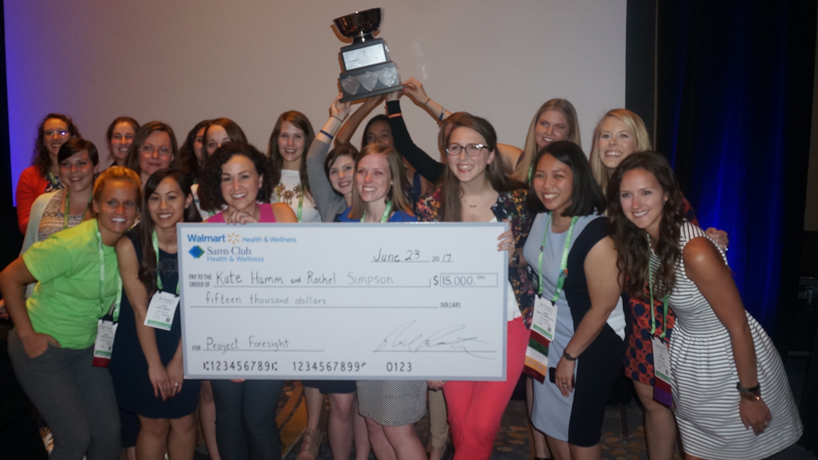
Optometry students Rachel Simpson (pictured here holding the left side of the check) and Kate Hamm (holding the right side) won the Wal-Mart and Sam’s Club Project Foresight national scholarship competition during the annual Optometry’s Meeting on June 23. This year’s event was held in Washington, D.C. (Photo courtesy of Rachel Simpson and Kate Hamm)
Third-year University of Missouri–St. Louis optometry students Kate Hamm and Rachel Simpson have remarkable vision.
Not the kind they’re learning how to care for every day in their program, but the kind that allows them to look at a problem and see a solution.
That’s exactly what they did in order to win the Wal-Mart and Sam’s Club Project Foresight Scholarship, a $15,000 accolade they officially collected June 23 during the annual Optometry’s Meeting in Washington, D.C.
More than one event or one monetary award, Project Foresight is a national competition that takes place over the course of several months and requires a presentation and win at a regional level before advancement to the final national round is possible.
Optometry students are tasked with envisioning the future of their profession and coming up with a specific plan for how Wal-Mart can be a part of making that future better and brighter. This year’s competition tasked students with answering how the company might attract more millennial optometrists to come work in its vision centers after graduation.
Hamm and Simpson took that prompt and ran with it, making their concept about much more than attractive perks for potential employees.
They designed a comprehensive, innovative program that could enrich the lives of all optometrists, provide a business model for other corporations and even eliminate systematic inequalities within the profession.
Termed the Wal-Mart Care Partners Program, the students’ concept envisions a group of traveling optometrists who could venture to Wal-Mart Vision Centers around the country and fill in for other full-time doctors – those who may need anything from maternity or paternity leave to extended sick leave or even, simply, a Saturday off.
Grounded in the value of work-life balance, the students say their idea – laid out in detail in their winning video presentation – also embraces the millennial passion for civic engagement and social awareness.
One of the proposed program’s most important elements aims to take on an issue Hamm and Simpson both feel passionate about – the wage gap.
Because the students knew from their research that salary negotiations are a huge contributor to wage inequality, they eliminated them from their concept. Their program would pay all of its traveling optometrists the same, non-negotiable starting salary – period.
“Last winter we read an article in ‘Review of Optometry,’” Simpson said, explaining where their commitment to addressing this particular issue began. “It illustrated how optometry is becoming more of a female profession in the sense that most optometry students are women, and it discussed the multiple forms of discrimination these women can face.
“Looking at race and gender specifically, it showed that some female optometrists are being shorted as much as $40,000 a year compared to their male counterparts. When I heard that and thought about it and looked around and realized how even my classmates were going to be affected, I just thought, ‘No. That’s not okay with me.’”
Hamm was immediately on board too.
“We realized we couldn’t just stand for something as large as this and not do anything about it,” she said. “We had to be able to confront it – and to confront ourselves and our own role in it too.”
Confront it they did – in ways that extend beyond their Project Foresight plan.
Last year, Simpson, with help from Hamm and several other optometry classmates, founded the United Optometrists Association in order to begin work on eliminating the wage gap while still a student.
Among its many efforts, the organization has hosted meetings aimed at educating students about salary negotiations and works to prepare future ODs to become ethical, fair-minded employers who hold themselves accountable to their own biases during hiring practices.
The fact that they look around and see so much more work to be done is one reason why Simpson and Hamm say they’re so appreciative of their Project Foresight win.
“We’re very grateful for the money – don’t get us wrong,” Simpson said. “But we also see this opportunity as being about so much more than a scholarship win. It’s given us a platform to talk about these issues we care very deeply about. We want to get out there and talk to other people who also care and are also doing things to create change. We want to share ideas.”
“This is absolutely a social priority,” Hamm added. “If we could solve the wage gap in optometry, think of what an example it would be for other professions.”















